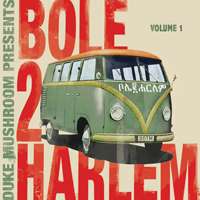Bole2Harlem
Bole2Harlem was a musical collaboration that fused elements of Ethiopian music with American hip hop. Bole2Harlem released one album, Bole2Harlem, Volume 1, in 2006. David "Duke Mushroom" Schommer, a producer, songwriter, and percussionist, founded the group with Ethiopian singers Tigist Shibabaw (the late sister of singer Gigi) and Maki Siraj.[1] The project's name refers to Bole, a neighborhood in Addis Ababa (and the site of Bole International Airport), and Harlem, New York City, where Schommer and Siraj were residents.
Bole2Harlem | |
|---|---|
| Origin | Harlem, New York City |
| Genres | Hip-hop, Ethiopian music |
| Years active | 2005–2006 |
| Website | web |
| Past members | David "Duke Mushroom" Schommer Tigist Shibabaw Maki Siraj Davi Vieira Dave Eggar Henok Tenesgen Balla Tounkara Sam "Carpete" Effron Gregg Fine Khalid M'Zouz |
History
The project has its roots in L'Orange Bleue, a New York cafe popular with African expatriates and where Schommer, Siraj, and Shibabaw would congregate.[1] Schommer had grown up immersed in Ethiopian culture: his father had helped establish a university in Ethiopia,[2] and consequently the family home was filled with Ethiopian art and stories.[3] Shibabaw and Siraj had made a recording after they met in 2005. Schommer, Shibabaw, and Siraj discussed an "Abesha MC" concept, with Shibabaw representing traditional Ethiopian styles (see Ethiopiques), and Siraj representing new musical trends.[4] Additional collaborators joined after hearing about the project through Schommer's other production activities.[4] Schommer and Siraj also trace the concept to the transit culture of Addis Ababa, where weyalas rapidly call out the destinations of share taxis (for example, "Bole, Bole, Bole, Bole...").[4] Schommer describes the idea of taking a New York taxicab and suddenly placing it and its passengers in Addis Ababa (thus, "Harlem, Harlem, Harlem, Harlem...").[4] The album cover art features a minibus similar to the vehicles used as share taxis. Tigist Shibabaw died in early 2008 in Bahar Dar, Ethiopia.[5]
Discography
Bole2Harlem, Volume 1
| (Duke Mushroom Presents) Bole2Harlem, Volume 1 | |
|---|---|
 | |
| Studio album by Bole2Harlem | |
| Released | 2006 |
| Recorded | Sounds of the Mushroom, Harlem MacSound, New York City |
| Genre | Hip hop, Ethiopian music |
| Length | 58:15 |
| Label | Sounds of the Mushroom |
| Producer | Duke Mushroom |
Sounds of the Mushroom released Bole2Harlem, Volume 1 in June 2006.[6] White Swan Records reissued the album in June 2011.[7]
According to Schommer, the track "Hoya Hoye" exemplifies the crossing of Ethiopian and American cultures. He explains how the title is derived from a Halloween-like celebration, in which children chant "Hoya, hoye, HO, hoya hoye, HO" while clapping and pounding sticks (see Buhe).[3][8] After hearing this chant sung in Addis Ababa, Schommer was further inspired by the beat of a hip-hop track he heard while walking through Harlem.[3] During this same walk, he also heard a Gospel choir singing as he passed a church, and decided to add the refrain ("Feeling all right!") to the song. The blues scale heard on the song is actually an abbreviated Ethiopian scale.[3]
The track "Bole 2 Harlem" appears on the compilation album Un Automne 2007.[9]
- Track listing
- "Bole 2 Harlem" - 4:12
- "Hoya Hoye" - 4:08
- "Enseralen" Gojo - 5:27
- "Ametballe" - 4:56
- "Hi Loga" - 4:19
- "Endegena" - 4:47
- "Home" - 5:55
- "Ya Selam" - 3:54
- "Aya Bellew" - 4:41
- "Harlem 2 Bole" - 2:28
- "Quralew" - 1:47
- "Ensaralen Gojo (Remix)" - 8:58
- "Africaye!" - 2:28
All Songs Written by:
- D. Schommer: Music
- M.Siraj, T.Shibabaw, D.Schommer: Lyrics
Except:
- #4, 11: D. Schommer: Music, M.Siraj: Lyric
- #3, 12:D. Schommer: Music, J.Bashir, M.Siraj: Lyric
- #6: D. Schommer: Music, M.Siraj, D.Vieira: Lyric
- Personnel
- David "Duke Mushroom" Schommer - Vocals, drums, percussion, beats, bass, keyboards
- Tigist Shibabaw - vocals
- Maki Siraj - vocals
- Fray - vocals, track 4
- Davi Vieira - vocals, percussion, track 5
- Dave Eggar - cello, #3
- Henok Temesgen - electric bass, tracks 4-5
- Robert Aaron - horns, tracks 2, 4, 6, 7, 13
- Joewarn Martin - keyboards, tracks 2-7
- Balla Tounkara - kora, vocals, track 10
- Sam "Carpete" Effron - guitar, tracks 1-3
- Gregg Fine - guitar, track 7
- Khalid M'Zouz - hand clapping, tracks 1-2, 7-10
Contributing artist
References
- Press release on Rock Paper Scissors, (accessed November 23, 2014).
- Harvilla, Rob (December 26, 2006). "Harlem Globetrotters". The Village Voice. Retrieved January 8, 2012.
- Marco Werman (February 2, 2007). "Bole2Harlem". The World. PRI. (transcript). Retrieved January 8, 2012.
- Derek Rath (January 15, 2007). "Bole2Harlem: Hearing Ethiopia in New York". Day to Day. NPR. Retrieved January 8, 2012.
- "Ethiopian Singer Tigist Shibabaw of Bole 2 Harlem Dies in Bahar Dar". WorldMusicCentral.org. January 21, 2008. Retrieved January 8, 2012.
- "Bole 2 Harlem Vol #1". Amazon. Retrieved January 8, 2012.
- "Bole 2 Harlem – Volume 1". Discogs. Retrieved 2011-01-06.
- "Ethiopian festivals". Selamta.net. Retrieved 2012-01-08.
- "Various – Un Automne 2007". Discogs. Retrieved January 8, 2011.
External links
- Official website (As cached by the Wayback Machine)